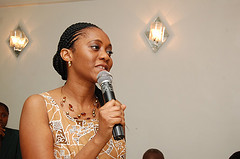Ayodele Arigbabu is the publisher, DADA Books. In this interview, he shares some really interesting futuristic ideas on publishing and social media which go beyond now. Get ready for social media and publishing, the sci-fi version, Arigbabu's version.
Publishing goes digital
The things that I see, many of them are not here yet. Just me, imagining. It is possible for me to design some things and post a digital file on my website and different people around the world can download and print on a million different machines around the world. I am interested in seeing what the implication of that will be. It will come back to being able to print the book in bulk; it may not be in the same way that we know the book to be today. Or it might be. But what if, it is possible to just do a digital file for a book?
What if the model changes so much and it does not matter if it is being pirated because the more popular it is, the more money you make. What if that model that works for blogs, also works for books, what if the model changes so much, as such the more people that download your book, the more money you make. The more popular it gets, the more money you make somehow. For example, Google ads, what if what you print carries ads and the more you print, the ads are synchronises somehow because the more people print it, the more they can make money from it. So, that means that you are now going to make money from people pirating your book, so to say.
Whoever comes up with that idea, it will change the game of publishing. There will just be no point selling; imagine someone locking up a blog and saying that you need some access code before you read, unless there is a serious need for it and then, the person won't make that much money. If this happens t traditional publishing, there will be a pyramid: a few people at the top, a few more people in the middle, and lots more people below.
Why are Nigerian programmers not tapping into the opportunities in the publishing sector?
There is a potential of technology. If you work with programmers, you will understand what is going on, many of them are doing copy and paste and they are not entrepreneurial. It is hard work. I can also understand why they are like that: this place is not like that place. So, to code for six months at a stretch, he will use his small generator, when there is no power; if your father is not rich, you have to fuel your gen yourself. I am sure that after the first month, you will ask yourself serious questions. Before long, you are tempted to take on the next job; you can only do one project at a time. The environment does not create that space for them to work. These guys are usually about cash and carry and it usually affects the quality of their skills, and they keep building replicative things that are easier to make, they don't code for innovative stuffs.
The hologram and publishing
The first game changer is the printing idea but the real game changer is the hologram. What we have right now with the Kindle and all that is that you must have the device, you must be on one ecosystem or the other but the beauty of the traditional book is that you can take it anywhere and everywhere, you don't need to be on any platform before you can read your book; you just buy it. You can carry it anywhere to read so that's where the holographic book comes in: you don't need a device to read and you don't need an object. You need a device but you are interfacing with the book, not as a device but as a hologram.
The hologram projects an object that is just a manipulation of light. You are just seeing something that looks like a book but it responds to your touch. Meaning that you can flip it as you read; everything that you do on your device you can still do with the hologram. Maybe your device can be small and you don't need to carry something bulky. Once you have that, it means that your films, your music can also be on it. It is like carrying a flash drive that contains all your files. You can beam it on the wall and read. That's the one I look forward to.
I know they do holograms of people. Like at teleconferences, a hologram will appear at the other end, and talk, instead of just seeing the person's face. Though it is still in the early stages. They did a Tupac show with Tupac on stage, where he was performing and interacting with the other performers on stage. However, it was just an actor somewhere, they did a 3D model of Tupac; the actor wore the motion capture stuff, they had rehearsed it perfectly, so he was doing his own thing somewhere and it was hologrammed on stage.
The Challenge
The problem is that I think up these things before they happen because I don't have the money to make it happen. So many of them. When I look at the trends in technology, I see where the logical end could be and the way it is, maybe somebody would have done that calculation, five years ago before me and the person has the capacity to do the coding and put a team together. We are working on all those things as well.
--The interview was sent in by Temitayo Olofinlua























.jpg)
.jpg)










.jpg)



